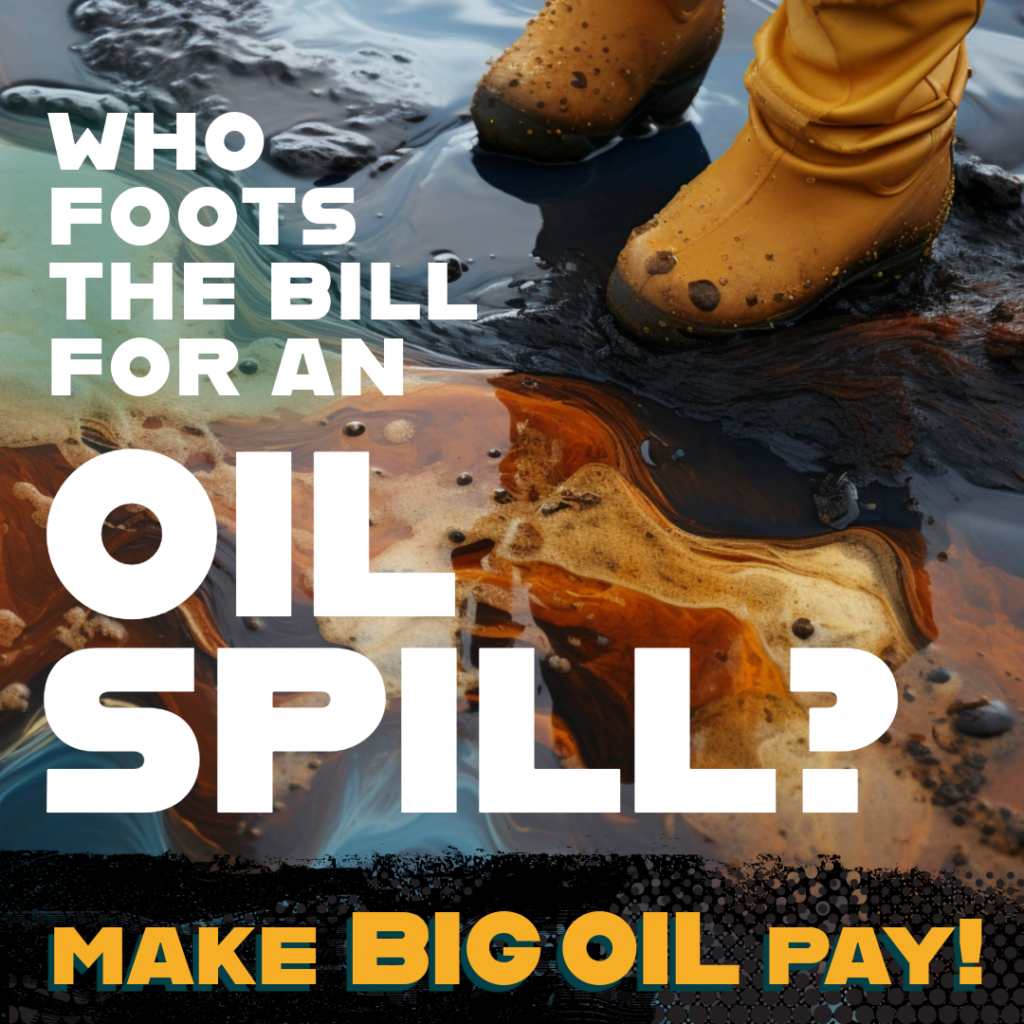
Ensure Accountability from the Oil Industry
The specter of a large oil spill looms over our region, casting a shadow of potential devastation. The stakes are high. At risk are our environment, economy, and cultural resources; the vulnerable Southern Resident killer whales and their dwindling food source, chinook salmon; the forage fish that nurture the salmon and the eelgrass that provides refuge for the creatures that call the coastlines of the Salish Sea home. All of this and much more are at risk from a major oil spill.
The risks & costs of oil spills in the San Juans & surrounding Salish Sea are high.
The Washington State Department of Ecology is conducting a rulemaking that will establish financial responsibility requirements for refineries, pipelines, and other bulk oil handling facilities (Class 1 facilities.)
Ecology’s draft rule will not come close to covering the estimated costs of a large oil spill.
Action is needed to ensure that Washington State’s oil industries won’t go bankrupt before covering all the costs of their oil spills.
Join us in advocating for robust financial responsibility requirements!
Let’s hold the oil industry accountable for their spills!
Tell the Washington State Department of Ecology that the draft financial responsibility requirements for Class 1 facilities are insufficient to cover oil spill response and damage costs. These measures are not just about protecting our natural environment—they’re about safeguarding our communities and way of life.
The comment deadline is
11:59 p.m. on Friday, March 8, 2024
Here are 3 recommended comments …
(more deep-dive info below and also via this PDF)
- The proposed $300 million maximum financial responsibility requirement for Class 1 facilities is not enough. At the very least, refineries, pipelines, and other bulk oil handling facilities should be required to have the same financial responsibility requirements as tank vessels and barges: $1 billion per facility.
- Financial responsibility requirements should prioritize sufficient compensation for oil spill impacts over oil industry profits. Tank vessels and barges can comply with the $1 billion financial responsibility requirement through P&I (protection & indemnity) clubs or mutual insurance associations. Class 1 facilities could do the same.
- Canada’s Trans Mountain Pipeline (Puget Sound), which transports Alberta tar sands to Washington State’s northern refineries, should have a financial responsibility requirement that is based on a higher per barrel amount in order to address the higher oil spill response and damage costs for spills of tar sands products. The basis for the Trans Mountain Pipeline’s financial responsibility requirement should be increased to at least $60,153 per barrel.
Where to submit comments and testify:
- Comment online via Ecology’s comment tool.
- Send comments by mail to:
Diana Davis
Department of Ecology, Northwest Regional Office
Spill Prevention, Preparedness, and Response Program
P.O. Box 330316
Shoreline, WA 98133-9716 - Learn more and testify at 1 of 3 online public hearings:
- Tuesday, February 27, 2024, 1:00 p.m.
Join online here, or by phone: 253-205-0468, Meeting ID: 834 1747 2748 - Wednesday, February 28, 2024, 6:00 p.m.
Join online here, or by phone: 253-215-8782, Meeting ID: 830 1503 3443 - Thursday, February 29, 2024, 10:00 a.m.
Join online here, or by phone: 253-215-8782 , Meeting ID: 879 2331 9517
- Tuesday, February 27, 2024, 1:00 p.m.
Ensure your comments and concerns are submitted by
11:59 p.m. on Friday, March 8, 2024!
Deep dive info about our comment recommendations:

The $300 million maximum financial responsibility requirement for facilities is not enough.
Ecology is establishing financial responsibility requirements for Class 1 facilities, which include refineries, pipelines, and other bulk oil handling facilities. RCW 88.40.025 requires facilities to demonstrate financial responsibility in an amount determined by Ecology “as necessary to compensate the state and affected federally recognized Indian tribes, counties, and cities for damages that might occur during a reasonable worst-case spill of oil from that facility into the navigable waters of the state.” Ecology has not determined what amount would be needed to provide adequate compensation.
The $300 million maximum financial responsibility amount is based on a 1993 study that used 1992 US dollar values to identify oil spill response and damage costs at $12,500 – $18,900 per barrel. The proposed financial responsibility requirements are based on the outdated and low-estimated $12,500 per barrel cost.
The $300 million maximum financial responsibility requirement for Class 1 facilities is the same amount that is required for passenger vessels with a fuel capacity of at least 6,000 gallons.
At the very least, Class 1 facilities should be required to have the same financial responsibility requirements as tank vessels and barges: $1 billion per facility.

Financial responsibility requirements should prioritize sufficient compensation for oil spill impacts over oil industry profits.
According to Ecology, “a large spill could cost the state $10.8 billion and 165,000 jobs.”1
The proposed $300 million maximum financial responsibility requirement would only cover a small fraction – 1/36th – of the $10.8 billion cost of a large oil spill.
The draft rule does not address current oil spill response and damage costs and exclusively addresses “the commercial availability and affordability of financial responsibility,” allowing oil industry profits to supersede the financial responsibility requirements needed to address the costs and damages from an oil spill.
Tank vessels and barges are able to comply with the $1 billion financial responsibility requirement through P&I (protection & indemnity) clubs or mutual insurance associations. Class 1 facilities could do the same.

Canada’s Trans Mountain Pipeline (Puget Sound), which transports Alberta tar sands to Washington State’s northern refineries, should have a financial responsibility requirement that is based on a higher per barrel amount in order to address the higher oil spill response and damage costs for spills of tar sands products.
The cost of the spill response and damage costs for the 2010 tar sands crude oil spill into the Kalamazoo River was $1,208,000,000 or $60,153 per barrel.
An oil spill from the Puget Sound spur of the Trans Mountain Pipeline could impact the Nooksack River, Lower Skagit River, Samish River, Sumas River, Swinomish Channel, Padilla Bay, the Salish Sea, and the human and animal communities that live near and within these waters.
The construction of Canada’s Trans Mountain Pipeline expansion project is more than 98% complete and expected to be operational by April 2024.2 This expansion project will increase the pipeline’s current capacity by 590,000 barrels per day, increase oil tanker traffic in the Salish Sea by 696 transits per year, and potentially increase the Trans Mountain Pipeline (Puget Sound) throughput to Washington State refineries.3
The basis for the Trans Mountain Pipeline’s financial responsibility requirement should be increased to at least $60,153 per barrel.
Take a further deep dive into Ecology’s Financial Responsibility Rulemaking with Friends of the San Juans’ informational report.
Thank you for getting your comments and concerns submitted by 11:59 p.m. on Friday, March 8, 2024!
Footnotes
- See Ecology’s Spill Prevention, Preparedness, and Response Program webpage: https://ecology.wa.gov/About-us/Who-we-are/Our-Programs/Spills-Prevention-Preparedness-Response.
See also Ecology’s January 2024 Preliminary Regulatory Analyses, page 36: https://apps.ecology.wa.gov/publications/documents/2408001.pdf. ↩︎ - Trans Mountain. January 12, 2024. Trans Mountain Receives Decision on Variance Application. https://www.transmountain.com/news/2024/trans-mountain-receives-decision-on-variance-application.
Reuters. January 24, 2024. Canada’s Trans Mountain pipeline expansion to start in April. By Arathy Somasekhar and Georgina Mccartney. https://www.reuters.com/world/americas/canadas-trans-mountain-pipeline-start-up-second-quarter-2024-01-24/. ↩︎ - U.S. Energy Information Administration. January 8, 2024. Canada’s Trans Mountain Pipeline expansion reportedly 95% complete. https://www.eia.gov/todayinenergy/detail.php?id=61184.
Trans Mountain. December 2018. Tug Escort Enhancements. (See Marine Traffic = By the Numbers). https://docs.transmountain.com/314-Enhanced-Tug-Escort-Fact-Sheet-12_20_18-four-page-HR.pdf. ↩︎
